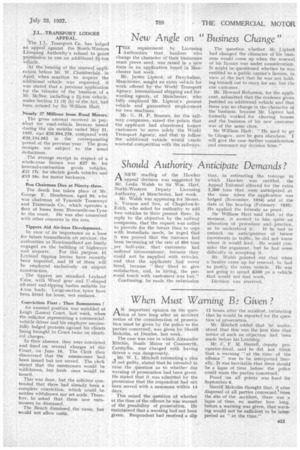When Must Warning Be Given ?
Page 35

If you've noticed an error in this article please click here to report it so we can fix it.
ANimportant opinion on the question of how long after an accident notice of the consideration of prosecution must be given by the police to the parties concerned, was given by Sheriff Malcolm, at Dundee, last week.
The case was one in which Alexander Ritchie., South Mains of Cononsyth, Carmyllie, was charged with having driven a van dangerously.
Mr. W. L. Mitchell intimating .a plea 01 not guilty, stated that he intended 1,0 raise the question as to whether due warning of prosecution had been given. He stated that it was admitted by the prosecutor that the respondent had not been served with a summons within 14 days.
This raised the question of whether at the time of the offence he was warned of the possibility of prosecution. He maintained that a warning had not been given. Respondent had received a slip
12 hours after the accident, intimating that he would be reported for the question of prosecution.
Mr. Mitchell added that he understood that this was the first time that notice of such an objection had been made before his Lordship.
Mr. C. F. M. Burrell, deputy procurator-fiscal, said he did not think that a warning "at the time of the offence " was to be interpreted literally. It was inevitable that there should be a lapse of time before the police could warn the parties concerned.
Proof On all points was fixed for September 6.
Sheriff Malcolm thought that, if after dispersal of all parties concerned, from the site of the accident, there was a lapse of time, no matter how long, before a warning was given, that warning would not be sufficient to be interpreted as " at the time,"




























































































